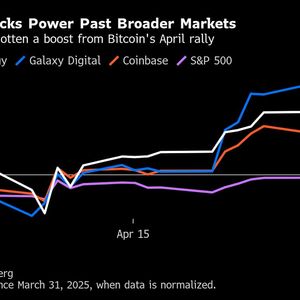Expert Warns XRP Holders: Banks and Governments Already Locked Their XRP In Escrow
4 min read
As market uncertainty and regulatory tremors continue to shake the crypto industry, concerns about exchange reliability and asset security are becoming more urgent. In a recent X post , crypto analyst Edo Farina issued a stark warning to XRP holders, urging them to withdraw their holdings to cold storage in anticipation of a potential market-wide upheaval. His comments are igniting widespread conversation across the XRP community, especially given his assertion that banks and governments have already secured their XRP through escrow mechanisms. Not financial advice, but withdraw your $XRP to a cold wallet. When Tether collapses and the market crashes, tearing BTC apart, exchanges may freeze withdrawals. Banks and Governments already secured their XRP locked in escrow. — EDO FARINA 🅧 XRP (@edward_farina) April 27, 2025 Why Cold Storage Is Becoming Critical Farina’s message reflects growing anxiety over the future of centralized exchanges in a scenario where systemic risk events—like the collapse of Tether (USDT) —could severely destabilize crypto markets. If such a breakdown were to occur, it could lead to the kind of liquidity crisis that forces exchanges to freeze withdrawals, a practice not unheard of during volatile periods. In this context, Farina’s advice is clear: retain custody of your XRP before external factors take that choice away. His concerns echo sentiments from previous crises—such as the FTX collapse—when user funds became inaccessible in the blink of an eye. By highlighting the potential for a cascading failure that affects everything from Bitcoin’s stability to Tether’s solvency, Farina is drawing attention to a worst-case scenario that responsible investors must prepare for, even if it never materializes. Institutional Accumulation and XRP Escrow A key aspect of Farina’s statement is the claim that governments and financial institutions have already locked up large quantities of XRP in escrow. This assertion is not without precedent. Ripple Labs, the company behind the XRP Ledger, routinely releases XRP from its programmatic escrow system , with the intent of maintaining market stability and transparency. A significant portion of these escrowed holdings has reportedly been earmarked for partnerships with banks, remittance services, and central banks exploring cross-border solutions. While exact details on institutional XRP escrow agreements are closely guarded, Ripple’s long-standing alliances with financial giants—such as Santander, SBI Holdings, and Bank of America—have led many to speculate that a quiet accumulation has been underway for years. If true, this underscores the importance of XRP as a strategic asset for governments and financial entities preparing for a digitally connected, tokenized financial infrastructure. What Happens If Tether Falls? Tether (USDT), the dominant stablecoin in the crypto market, plays a crucial role in facilitating liquidity and price stability. A collapse in its value or trust could send shockwaves across every trading pair, especially on centralized exchanges that rely on Tether for settlement. In this type of contagion event, exchanges would likely implement emergency measures, such as halting redemptions and freezing asset withdrawals, leaving users without access to their funds. We are on twitter, follow us to connect with us :- @TimesTabloid1 — TimesTabloid (@TimesTabloid1) July 15, 2023 Farina’s call to move XRP to cold wallets—secure, offline storage solutions—stems from this fear. Cold wallets are immune to exchange lockouts, custodial failures, or internet outages, making them a preferred option for long-term holders seeking to preserve control over their assets regardless of market turbulence. The Bigger Picture: A Geopolitical Play? The idea that banks and governments are already locking in XRP suggests more than just investment hedging. It implies a strategic positioning for the next evolution in global finance, where XRP could serve as a bridge currency in an interconnected system of CBDCs (Central Bank Digital Currencies), tokenized real-world assets, and liquidity hubs. With Ripple already selected by several governments as a platform for CBDC pilot programs, and with more institutions exploring blockchain for cross-border settlements, XRP appears to be gaining traction as the infrastructure backbone for the coming financial paradigm. If this transformation accelerates, retail holders of XRP may find themselves holding an increasingly rare asset—assuming they’ve taken steps to secure it. Edo Farina’s warning is not an isolated cry of alarm, but rather a timely reminder of the importance of self-custody and strategic foresight in an unpredictable industry. As the regulatory climate tightens and financial institutions quietly deepen their blockchain integration, XRP holders are advised to think beyond short-term market moves and consider the long game. The question isn’t just whether XRP will survive market shocks. It’s whether everyday holders will still have access to it when the dust settles. Disclaimer : This content is meant to inform and should not be considered financial advice. The views expressed in this article may include the author’s personal opinions and do not represent Times Tabloid’s opinion. Readers are urged to do in-depth research before making any investment decisions. Any action taken by the reader is strictly at their own risk. Times Tabloid is not responsible for any financial losses. Follow us on Twitter , Facebook , Telegram , and Google News The post Expert Warns XRP Holders: Banks and Governments Already Locked Their XRP In Escrow appeared first on Times Tabloid .

Source: TimesTabloid



